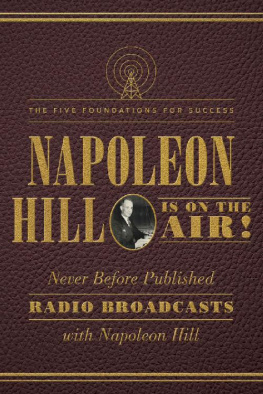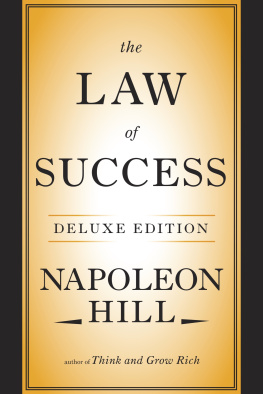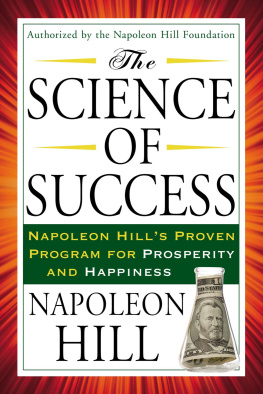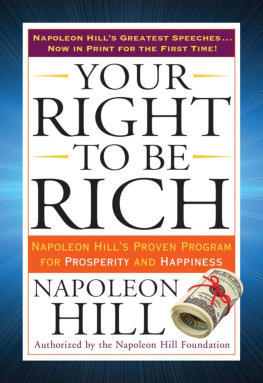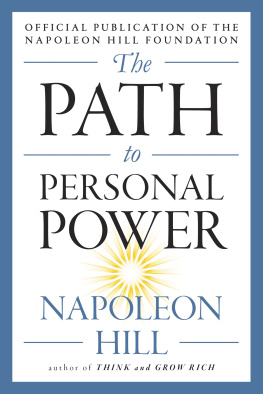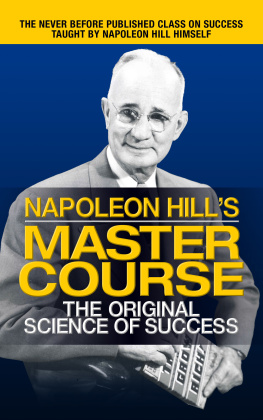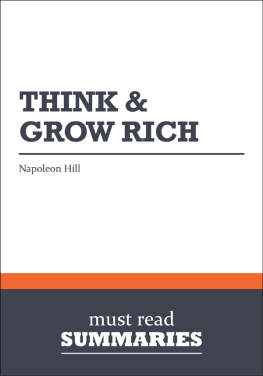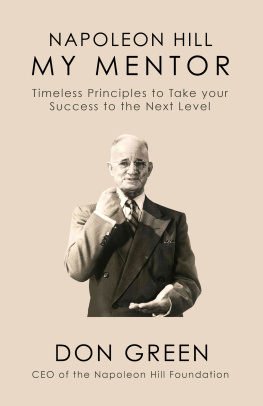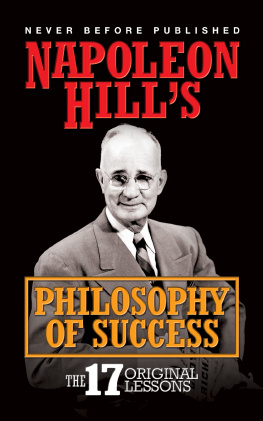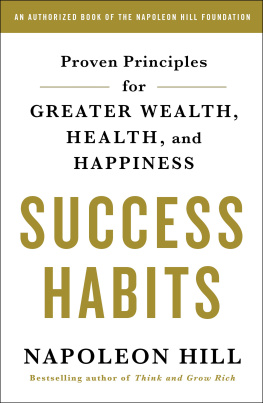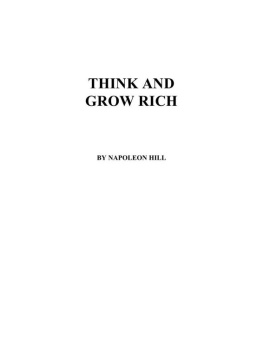

Text copyright 2017 by the Napoleon Hill Foundation
All rights reserved.
No part of this book may be reproduced, or stored in a retrieval system, or transmitted in any form or by any means, electronic, mechanical, photocopying, recording, or otherwise, without express written permission of the publisher.
Published by Grand Harbor Press, Grand Haven, MI
www.brilliancepublishing.com
Amazon, the Amazon logo, and Grand Harbor Press are trademarks of Amazon.com, Inc., or its affiliates.
ISBN-13: 9781503942912
ISBN-10: 1503942910
Cover design by Faceout Studio
CONTENTS
EDITORS NOTE
In 1883, in the mountains of Wise County in southwest Virginia, Oliver Napoleon Hill was born into poverty. His father, James, was a jack-of-all-trades, and little is known about his mother, Sara, who died when Napoleon was nine years old. The eldest of two sons from his parents marriage, Napoleon was named after a rich uncle to gain favor and, hopefully, an inheritance. That plan didnt work, but Napoleon would eventually discover his own riches, financial and otherwise.
Growing up, Napoleon Hill was a wild young man, known for carrying his six-shooter with him every chance he got, just like his hero, the outlaw Jesse James. He had very little education and few material advantages, later describing Wise County as famous for three things: moonshine, feuding, and ignorant people.
At ten years old, Napoleons direction in life changed when his father remarried. An educated and refined woman, his stepmother, Martha Ramey Banner, soon had Napoleon attending church and buckling down in school. She convinced him to trade his six-shooter for a typewriter and encouraged him to write. He followed her advice and discovered he had a talent. He would go on to become one of the most widely read authors in the world.
While working as a reporter for Bob Taylors Magazine in 1908, Napoleon was assigned to interview the steel magnate Andrew Carnegie. Mr. Carnegie, founder of U.S. Steel Corporation, took an immediate liking to Napoleon and, after three days of interviews, made him an offer that would completely change his life. Mr. Carnegie said he would introduce Napoleon to the most successful men in America if Hill would spend up to twenty years, without pay, distilling and compiling from these interviews the first-ever written philosophy of success.
During those twenty years Napoleon also operated a number of businesses, some successful, some not. He was an executive at a gas company, owned a candy company, and taught in business and correspondence colleges. He published two motivational magazines, Hills Golden Rule and Napoleon Hills Magazine , and, with introductions from Andrew Carnegie in hand, he met and interviewed hundreds of the most successful men of his day, including Thomas Edison, Henry Ford, Dr. Alexander Graham Bell, F. W. Woolworth, Harvey Firestone of the Firestone Tire and Rubber Company, and John Wanamaker.
In 1928, after Napoleon had completed his twenty-year task, he published the eight-volume work The Law of Success . In 1937, amid the Great Depression, he published a condensed version of that work, which he called Think and Grow Rich . Now recognized as one of the bestselling and most influential motivational books written, Think and Grow Rich has been translated into more than forty languages and has influenced hundreds of millions of people throughout the world.
Napoleon Hill went on to write many more motivational books, including The Magic Ladder to Success , How to Sell Your Way through Life , The Master Key to Riches , and How to Raise Your Own Salary . He served as an adviser to two presidents, Woodrow Wilson and Franklin D. Roosevelt and, during the 1930s and 1940s, continued his educational businesses and lectured widely.
In 1941, Dr. William Plumer Jacobs II, president of the Presbyterian College in Clinton, South Carolina, brought Napoleon to Clinton to write Mental Dynamite , booklets that covered the seventeen success principles Napoleon had discovered. Nearly ten years later, Napoleon settled happily into semiretirement. But in 1952, while delivering a speech to the Rotary Club in Chicago, he met W. Clement Stone, a wealthy insurance man. Mr. Stone had given away thousands of copies of Think and Grow Rich over the years, and he believed so fervently in the principles of success that he coaxed Napoleon out of retirement. Together they went on to offer courses based on the success principles and wrote the bestselling book Success through a Positive Mental Attitude .
In 1953, a year after teaming up with Napoleon Hill, Mr. Stone arranged for him to present a series of radio broadcasts on a local radio station in Jackson, Mississippi, in the hopes it would help the people of that city achieve greater success. These broadcasts were well received, and Napoleon would continue to conduct radio and television shows in other cities throughout the United States until his death in 1970.
The book youre about to read contains the transcripts from that series of Jackson radio programs that Napoleon Hill launched in 1953. It allows you, the reader, to experience almost verbatim what Napoleon shared directly with his listeners.
In these broadcasts, he highlights what he called the Big Five of the seventeen distinct principles of successDefiniteness of Purpose, the Mastermind, Applied Faith, Going the Extra Mile, and Creative Visionand includes examples of how these five principles have led some famous and not-so-famous people to success. He also includes a number of clues about his single most important success principle. Napoleon never told the world what that principle was, not in these broadcasts or anywhere else, leaving his readers and listeners to discover it for themselves. But he said many times that when his followers were ready, they would discover what he called The Supreme Secret of Personal Achievement.
Perhaps you will be ready to discover it as you read these never-before-published broadcasts.
INTRODUCTION
I am a medical doctor living in Conway, South Carolina, and enjoying my ninth decade of life. I am also the chairman of the Napoleon Hill Foundation and the nephew of its famous namesake. So I was thrilled when Grand Harbor Press asked me to provide some memories of growing up with my remarkable uncle Nap, to be used as an introduction to this book.
When I was very young, my parents divorced, and my mother and I moved in with my unmarried aunt, Annie Lou Norman, in Clinton, South Carolina. Annie Lou had a responsible job at the W. P. Jacobs Company, a large publishing firm owned by Dr. William Plumer Jacobs, who also served as president of Presbyterian College in Clinton. As she was on her own and busy with work, she needed someone to keep house for her. In return for this service, she offered to support my mother, who at the time had no other skills with which to support her family, namely me.
We werent the only ones Aunt Annie Lou looked after. Another sister, my aunt Mary, also moved in, along with her two daughters, Patricia and Mary Ruth, and, to my great dismay, their two female dogs. It was quite distressing to me that I was the only male in that big three-story house. My only interaction with father figures was through some of my friends fathers, who kindly took me fishing and hunting. Then one day, Annie Lou took in another boarder, a gentleman brought to Clinton by Dr. Jacobs to write a series of motivational books and present lectures. He was, of course, Napoleon Hill.
Next page
